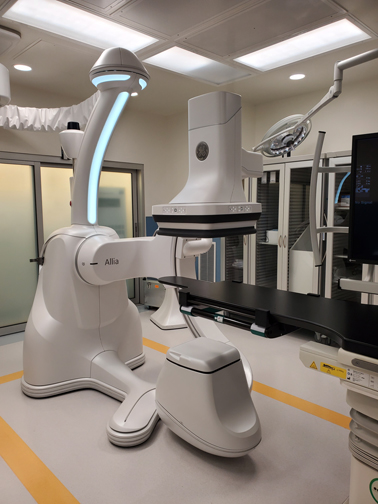
A new lab at USC Verdugo Hills Hospital uses diagnostic imaging tools and robotic technology to quickly treat critical cardiac cases. The Interventional Radiology and Cardiac Catheterization Laboratory (IR/Cath Lab) at USC Verdugo Hills Hospital (USC-VHH) is designed to provide quick, comprehensive emergency cardiovascular care – a critical resource for nearby patients when every second counts.
In addition to diagnostic tools to view a patient’s heart and identify abnormalities during a critical event, the lab’s on-site interventional radiology team enables fast action via imaging tools such as X-ray, fluoroscopy, computerized tomography (CT), MRI or ultrasound.
These tools allow doctors to guide small instruments through the blood vessels for lifesaving procedures, such as angioplasty or stenting – both of which previously could not be performed at USC-VHH. However, USC-VHH now offers the latest and best technology to deliver robotic-driven imaging and cardiac care and is among only 20 hospitals nationwide and the first IR/Cath Lab in Southern California with these tools.
Expert cardiac collaboration, quick care delivery
By ensuring that cardiac emergency patients can be treated without delay, the lab delivers “an additional aspect of state-of- the-art care,” said Vaughn Starnes, MD, executive director of the USC Cardiac and Vascular Institute.
The lab isn’t just for USC-VHH doctors. Community physicians also have access, and it’s staffed by community specialists alongside Keck Medicine of USC cardiovascular physicians at USC-VHH, who are available to offer academic medical expertise for complex cases.
“The most important factor is the time of delivery of care,” said Armand Dorian, MD, chief executive officer and former chief medical officer of USC-VHH.
For Sue Wilder, who co-chaired the lab’s fundraising committee with her husband, Steve, the mission is personal.
When her brother suffered a heart attack several years ago, the nearby hospital didn’t have an IR/Cath Lab to pinpoint the cause or determine the best course of action. She believes it could have saved his life.
“That’s why I was passionate about getting a lab here at USC-VHH,” Wilder said.
